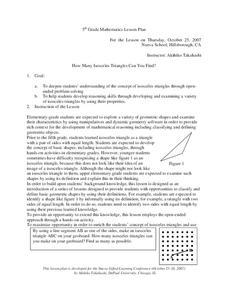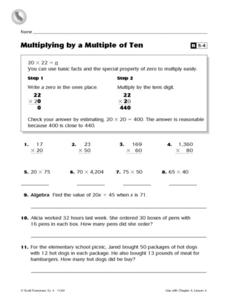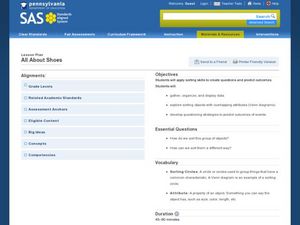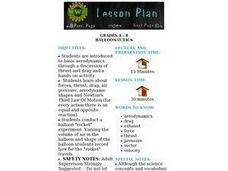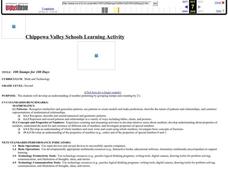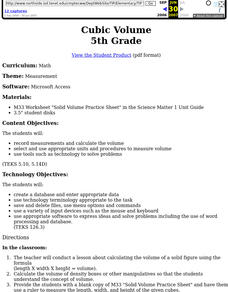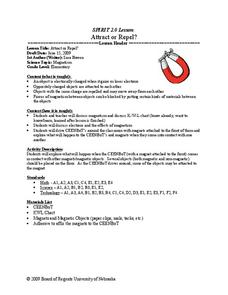Curated OER
How many isosceles Triangles Can You Find?
Fifth graders solve problems while examining a variety of isosceles triangles. For this isosceles triangle lesson, 5th graders examine shapes to find their characteristics. Students pay particular attention to the...
Curated OER
How many isosceles triangles can you find?
Seventh graders recognize the characteristics of isosceles triangles. In this isosceles triangle lesson, 7th graders use geoboards to create isosceles triangles. Students record results and explain why they have an isosceles triangle.
Curated OER
Be a Structural Engineer!
Students investigate how to design and build items with a focus on structural strength as an engineer would. They complete a truss-building project as a final assessment.
Curated OER
One Good Turn Deserves Another
Students make observations about shapes and 1-, 2-, and 3-dimensional objects. They conduct observations and make predictions regarding transformations of simple geometric shapes. They identify shapes that occur in household items.
Curated OER
Geoboard Squares
Young scholars create squares of different sizes on a geoboard. They find and describe a pattern. Students use the pattern to determine the number of squares possible on a 10-by-10 geoboard. They create squares with a horizontal base...
Curated OER
Rep Tiles
Third graders use pattern blocks of one shape at a time to try to create a similar shape. They compare the perimeter of the new figure with the perimeter of the original shape and look for a pattern. Students use the pattern to predict...
Curated OER
Multiplying by a Multiple of Ten
In this multiplication worksheet, 4th graders multiply 8 multiplication math problems by different multiples of 10. Students answer 3 word problems on the lines provided.
Curated OER
The Energy of Empty Space
In this energy in empty space learning exercise, students use an equation for Cosmic Inflation to solve eight problems. They find the domain and range of the function of the equation, they determinethe axis of symmetry, they find the...
Curated OER
DOWNHILL DISCOVERIES
Young scholars studykinetic energy, friction, drag and acceleration by relating it to the Winter Olympics. In this physical properties lesson students create tracks and determine how the course conditions affect bobsled, luge...
Curated OER
Sound--Music or Noise?
Students are introduced to the concept of sound and how it is presented in the world around them. Using scientific terms, they describe the properties of sound and create their own definitions of sound, music, and noise. They demonstrate...
Curated OER
Introduction to Fractions
Fourth graders break into groups having 10 come to the front and figure out the fraction of students are wearing jeans, glasses, have brown hair, etc. They write the fraction together. Each student then makes a picture and be able to...
Curated OER
All About Shoes
Students sort shoes. In this sorting lesson, students use shoes to explore attributes and practice sorting. This lesson encourages the use of a Venn Diagram to aide in student sorting.
Curated OER
Balloonautics
Learners are introduced to basic aerodynamics through a discussion of thrust and drag and a hands-on activity. They examine the forces of thrust, drag, air pressure, aerodynamic shapes and Newton's Third Law Of Motion.
Curated OER
Symme"tree"
Students practice drawing lines of symmetry after the teacher draws shapes on the board. They create a class symme"tree" using only symmetrical shapes to decorate it.
Curated OER
100 Stamps for 100 Days
Second graders count by 2's to get to 100. In this counting lesson plan, 2nd graders use the program Kid Pix to create stamps two at a time until they get to 100.
Curated OER
Sum of the Parts
Fifth graders build objects using various materials. They estimate the weight of the object using individual building pieces. Then they weigh the actual object and then tear it apart and weigh the pieces. They compare the two weights.
Curated OER
Reflections
Fifth graders create a reflection of a poygon using a Mira. They discover that a line connecting a vertiex of a polygon and the corresponding vertex of its reflection is perpendicular to the line of reflection. Students create a glide...
Curated OER
Building a Native American Home
First graders explore different types of Native American shelters. In this Native American homes lesson, 1st graders compare the shapes of shelters used by Native Americans. They build a home using the program "Community Construction...
Curated OER
Where Have All the Endangered Gone?
Students explore animals that are endangered. They choose an endangered animal that they would like to keep from becoming extinct. Students create a persuasive presentation to persuade someone to understand why they feel keeping their...
Curated OER
It's a 3-D World Out There!
Students construct polygons. They identify attributes of three-dimensional shapes. Students name common three-dimensional shapes. They draw three-dimensional shapes, and sort three-dimensional shapes. Students use K'NEX materials sets to...
Curated OER
Investigating Nets and Polyhedra
Fifth graders create a net for a given polyhedron. They determine the corresponding polyhedron for a given net. Students investigate several polyhedra (cube, tetrahedron, and one of their choosing) and their corresponding nets. They...
Curated OER
Cubic Volume
Fifth graders record measurements and calculate the volume. They select and use appropriate units and procedures to measure volume # use tools such as technology to solve problems
Curated OER
BUGS-INSECTS
Students participate in a theme study while teaching primary students basic skills according to Individual Education Plan (IEP) goals in Reading, Math, and Writing. The lesson is concerned primarily with the concept of insects.
Curated OER
Attract or Repel?
Students explain why some objects attract and some do not. In this physics lesson, students investigate the magnetic properties of objects using CEENBoT. They give some important applications of magnets.
